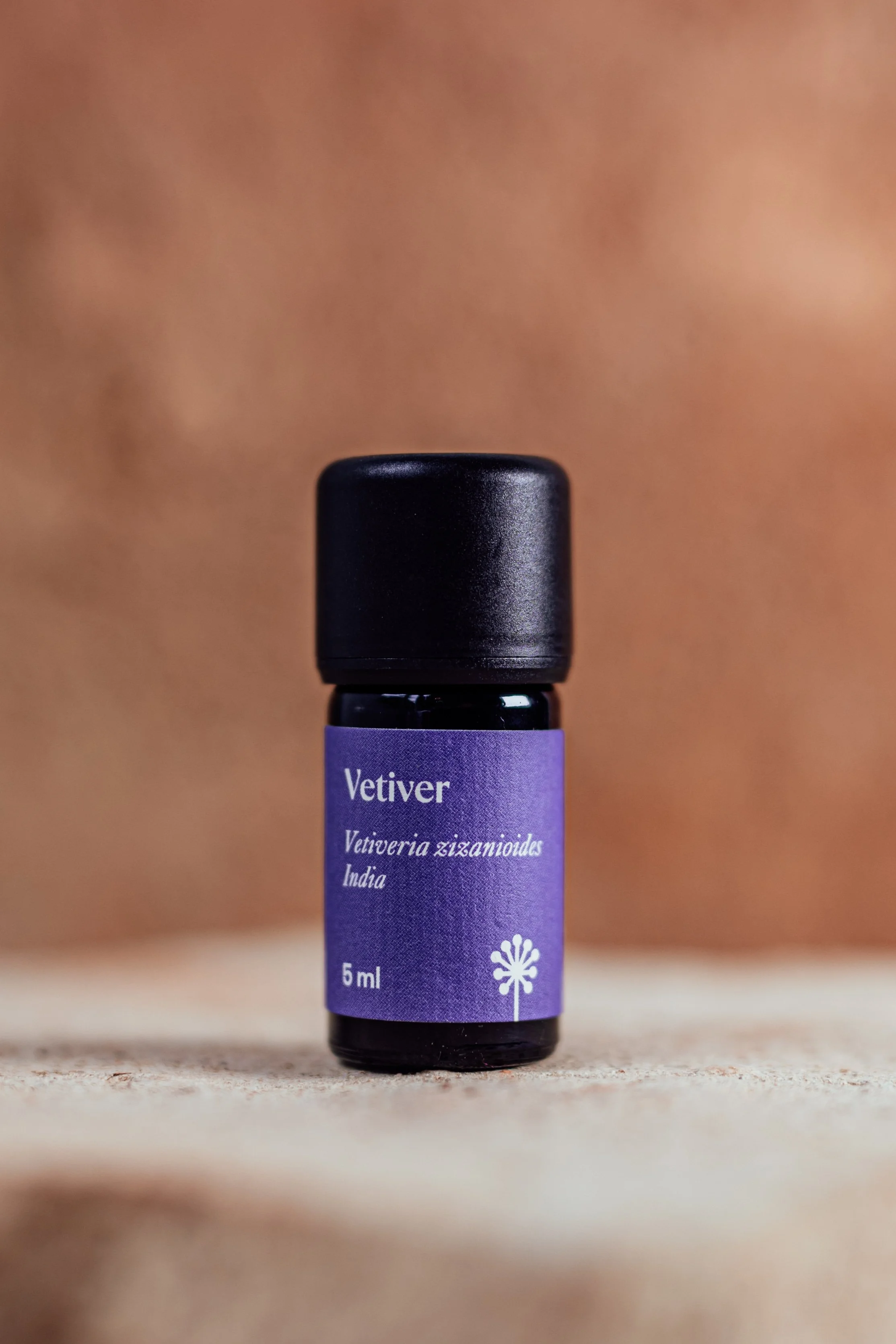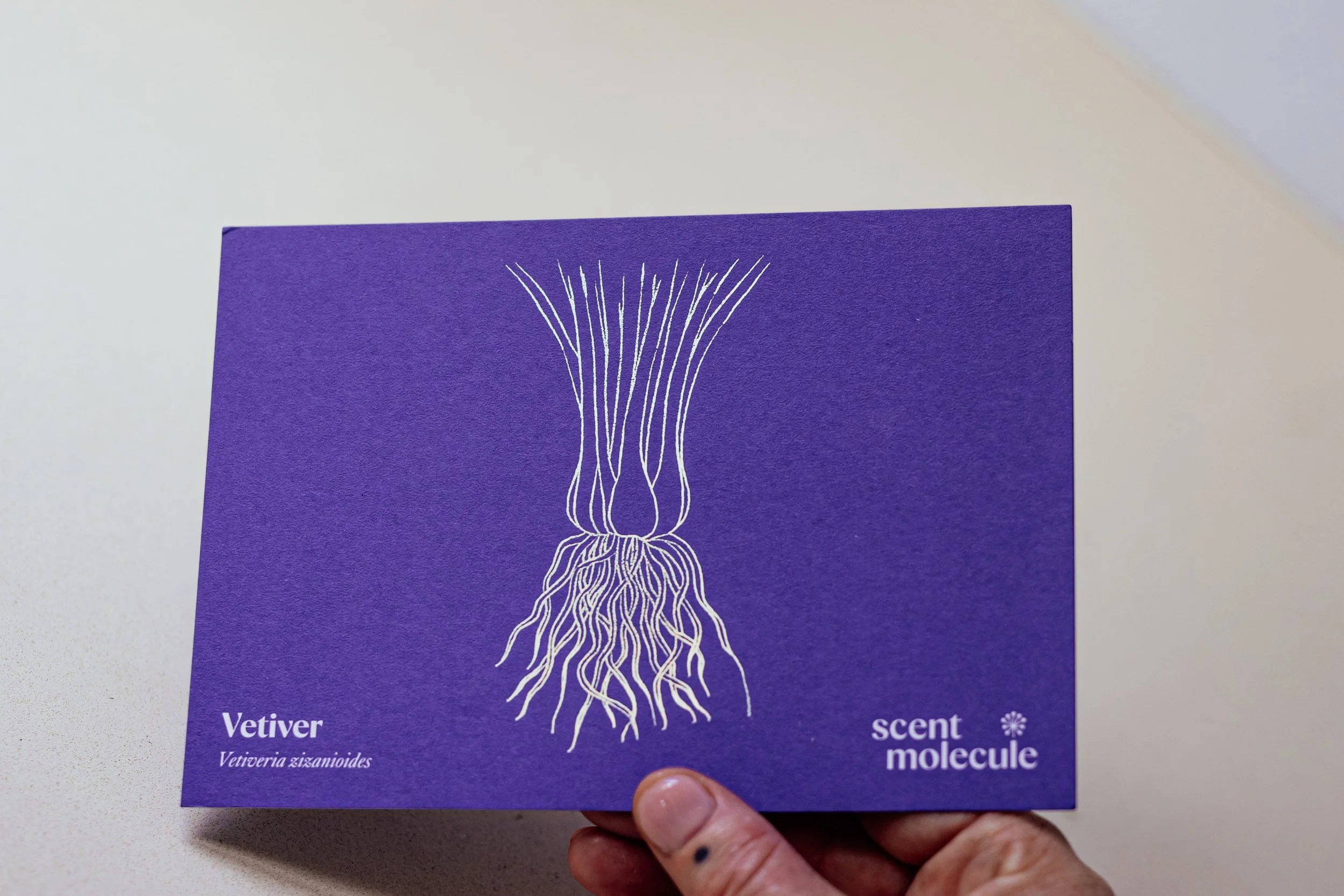-
-
Adults (general use): 1–3%
Children 7–12 years: 0.75–1%
Always dilute essential oils before applying to the skin. For facial or sensitive skin applications, a 0.5–1% dilution is ideal.
-
Wild-harvested Khus (Vetiver) from India carries a deep, ancestral resonance, anchoring the spirit into the body and drawing awareness down through the energetic layers into grounded presence. Known as the “oil of tranquility,” vetiver is revered in Ayurvedic and yogic traditions for pacifying excessive Vata and tethering scattered or dissociative states.
It acts as a stabilising force in times of emotional upheaval or spiritual overload, helping to re-centre fragmented energy and restore coherence in the aura. Its earthy, smoky scent creates a protective boundary, often used in rituals to clear chaotic energy and reconnect to the rhythms of the earth. Vetiver’s energetic signature is cooling, calming, and slow-moving. Ideal for those who tend to “float above” their bodies or feel overstimulated in modern life.
Use during:
Grounding rituals or embodiment practices
Spiritual integration after plant medicine or intense inner work
Energy work requiring auric fortification and downshifting
-
Vetiver is a natural sedative for the nervous system, making it a potent support during times of emotional exhaustion, sensory overload, or anxiety. Its slow, dense scent soothes the hyperactive mind and is especially helpful when mental restlessness keeps the body in a low-grade stress state.
Its stabilising influence helps ease circular thinking, obsessive worry, and emotional disconnection. Particularly supportive for those recovering from burnout, trauma, or who tend to dissociate under pressure. Vetiver also supports sleep onset and nervous-system repair.
Use it for support nervous system regulation
Alleviate overstimulation, panic, and mental fatigue
Assist with sleep hygiene or restoration after emotional trauma
-
Vetiver essential oil is traditionally used in natural wellness for its stabilising and restorative qualities. It is often included in skincare and personal care formulations due to its deep, earthy composition and rich sesquiterpene profile.
Commonly used in skin care preparations designed to comfort dry, irritated, or heat-affected skin
Often found in balms and oils formulated to support general recovery and restoration
Favoured for its long-lasting aromatic profile and use as a natural fixative in perfumery
Incorporated into blends for personal care and body oils where a grounding, earthy base is desired
Suitable for formulations that focus on maintaining skin health during seasonal changes
Widely used in traditional wellness for its warming and circulatory-supporting aroma
-
Vetiver offers a rich, earthy base note with smoky, woody, and damp root-like undertones. Its scent is tenacious, grounding, and unmistakably deep — evoking freshly tilled earth after rain or the stillness of shaded forest floors.
Perfumery Notes:
Note: Base
Fixative Strength: Excellent — anchors and prolongs more volatile top notes
Blends well with: Patchouli, Sandalwood, Rose, Jasmine, Neroli, Clary Sage, Frankincense
Vetiver lends depth and longevity to natural perfumes, especially those with an earthy, mystical, or sensual character.
-
Vetiver essential oil is deeply grounding and rich in sesquiterpenes, making it a concentrated essence best used thoughtfully. The following safety considerations reflect aromatherapy best practice, including guidance from Tisserand & Young:
Always dilute before applying to the skin. A 1–3% dilution is suitable for general topical use. For facial application or sensitive skin, use a 0.5–1% dilution.
Avoid contact with eyes, mucous membranes, and broken skin.
Keep out of reach of children.
Vetiver’s viscous texture may stain light fabrics. Apply with care.
While this oil is widely regarded as safe, we recommend consulting a qualified healthcare practitioner if you have any serious medical conditions or are undergoing treatment.
If you are pregnant or breastfeeding, please seek guidance from a qualified clinical aromatherapist before topical use.
Although our founder is extensively trained in clinical aromatherapy and aromatic medicine, we do not recommend internal use of essential oils without the supervision of a qualified practitioner. Internal use requires professional knowledge, individual assessment, and strict dosage control.
-
Vetiver essential oil is rich in sesquiterpenes and possesses excellent oxidative stability. When stored correctly, it has an unusually long shelf life, often improving in character over time.
Storage: Store in a cool, dark place away from heat, direct sunlight, and moisture. Always keep the cap tightly sealed to minimise air exposure and preserve aromatic integrity. Violet glass bottles provide added protection from light and are ideal for this oil.
Shelf Life: 6–8 years or longer if stored well.
Signs of Oxidation: If the aroma becomes noticeably sour, sharp, or flat, discontinue topical use and consult with a qualified practitioner regarding potential repurposing.


